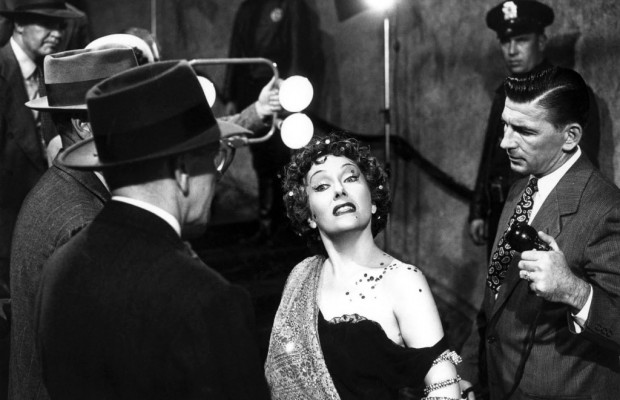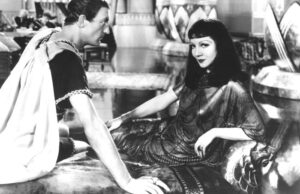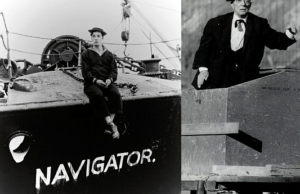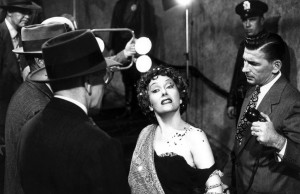Sunset Boulevard (1950)

Toronto Film Society presented Sunset Boulevard (1950) on Monday, April 1, 1974 in a double bill with I Walked With a Zombie as part of the Season 26 Monday Evening Film Buff Series, Programme 5.
Production Company: Paramount. Producer: Charles Brackett. Director: Billy Wilder. Based on a story by Charles Brackett and Billy Wilder. Screenplay: Charles Brackett, Billy Wilder, D.M. Marshman, Jr. Art Directors: Hans Dreier, John Meehan. Sets: Sam Comer, Ray Moyer. Music: Franz Waxman. Photography: John F. Seitz, Doane Harrison, Arthur Schmidt.
Cast: William Holden (Joe Gillis), Gloria Swanson (Norma Desmond), Erich Von Stroheim (Max Von Mayerling), Nancy Olson (Betty Schaefer), Fred Clark (Sheldrake), Jack Webb (Artie Green), Lloyd Gough (Morino), Cecil B. DeMille, Hedda Hopper, Buster Keaton, Anna Nilsson, H.B. Warner, Ray Evans, Jay Livingston, Sidney Skolsky (Themselves), Franklyn Farnum (Undertaker), Larry Blake, Charles Drayton (Finance Men).
Perhaps none of the films made about films exhibits so much self-hatred and cynicism as Billy Wilder’s Sunset Boulevard. In the best film noir tradition, it begins with a corpse floating in a Beverly Hills swimming pool and the dead man’s voice narrates the events leading up to his murder. And the story he tells is one of the most fascinating in Hollywood’s history.
“A young scriptwriter, speeding away from the finance-company men who have come to repossess his car (it is Los Angeles, where a man can get along without his honor, but not without his car) turns into a driveway on Sunset Blvd and finds himself in the fantastic, decaying mansion of the once-great silent screen-star, Norma Desmond. Attended by her butler, who was once her husband and her director, she lives among the mementos of her past and plots her comeback. The rapacious old vamp persuades the young man to stay and work with her on the script: he becomes her kept man, her lover, her victim.
“The details of the film are baroque and glittering: the rats in the empty swimming pool; the wind moaning in the organ pipes; the midnight burial scene, when the star and her butler put a pet chimpanzee in the garden–with full honors; a grisly weekly bridge party with a table of phantoms. The whole enterprise exudes decadence like a stale, exotic perfume. The film is almost too clever–yet it is at its best in thus cleverness, and is much less interesting when it deals with normal human beings (the sequences involving modern Hollywood). Charles Brackett and Billy Wilder have helped to create modern Hollywood; their pictures have no sweetness, no simplicity, no spontaneity. Even to them, at the top, this modern, wisecracking, anxious, realistic businessman’s community fades into insignificance when contrasted with Norma Desmond’s leopardskin past. The opulence, the grandeur, the primitivism, the extravagance, the glamour and insanity of those days when movies were new and already corrupt–these are the heart of Sunset Boulevard.
Kiss Kiss Bang Bang by Pauline Kael
“Miss Swanson, required to play a hundred per cent grotesque, plays it not just to the hilt but right up to the armpit, by which I mean magnificently. Largely through what is done with Miss Swanson, the silent era, and art, are granted a kind of barbarous grandeur and intensity, but the inference seems to be that they are also a good deal hammier than they actually were at their best. Further inference appears to be that the movies have come a long way since then. In many ways they have; in many other and important ways, this is open to argument and no such argument appears in this picture. On the other hand a great deal of truthfulness is achieved virtually without pointing or comment, by the people themselves. The lost people are given splendor, recklessness, an aura of awe; the contemporaries by comparison, are small, smart, safe-playing, incapable of any kind of grandeur; and those who think they can improve or redeem the movies are largely just a bunch of what Producer Fred Clark aptly calls Message Kids. This is certainly a harsh picture of Hollywood. By still quieter inference, of course, Hollywood is still essentially all right because it can produce such a picture as Sunset Boulevard; and with that, the considerable distance it goes, one is bound to agree.”
Sight and Sound, 1950, by James Agee
Billy Wilder and Charles Brackett’s other films together include: The Lost Weekend and A Foreign Affair.














[…] (x) […]